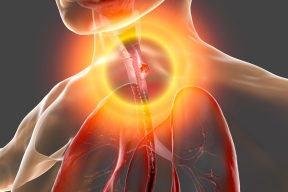The Facts About Esophageal Cancer
From an interview with
Dr. Amaninder Dhaliwal
McLeod Digestive Health Center
Barrett’s esophagus is considered a precancerous condition that increases the risk of esophageal cancer. While only a small percentage of patients with Barrett’s esophagus end up developing esophageal cancer, it is important to monitor the condition in case it starts to progress. McLeod Interventional Gastroenterologist Dr. Amaninder Dhaliwal tells us more.
What is Barrett’s esophagus?
Normally, a person’s esophagus, or food pipe, has a special kind of lining called the squamous lining. Meanwhile, the stomach, because it carries acid in it, has a special kind of lining called the columnar lining, which prevents any changes or erosions in your stomach from the acid reflux. Those two linings meet at the junction where your esophagus and stomach meet.
With the passage of time, that stomach acid can erode that junction area. When that happens, the lining changes from squamous to columnar. That means the stomach lining invades the food pipe. This is called Barrett’s esophagus, which can lead to the presence of abnormal cells within a tissue or organ and can become esophageal cancer. This condition is a primary concern for us when we are doing an endoscopy screening.
What are the risk factors for esophageal cancer?
Caucasian men in their 50’s and older are the most at-risk population for esophageal cancer. There are several risk factors that can lead to this disease, including:
- Obesity; people with a Body Mass Index (BMI) of more than 30 and a high waist-to-hip ratio
- Smoking
- Alcohol use
- Unhealthy diet
- Family history of esophageal cancer
In addition to Barrett’s esophagus, what are the signs of esophageal cancer?
One of the early signs of esophageal cancer is when a patient’s acid reflux is not being controlled with medication. Number two is difficulty swallowing. Sometimes patients feel as if food is getting stuck somewhere in their chest; they are not vomiting, but it’s uncomfortable, and they are chugging a lot of water. Patients may start losing weight.
These are subtle signs that can indicate something is not right. I always tell my patients not to wait to see a doctor. Symptoms do not get better on their own, so they need to be investigated – the earlier, the better. We have many techniques to help patients with this condition. Ignoring the issue is not going to help but only worsen the situation.
To learn more, speak with a gastroenterologist near you.
-
McLEOD REGIONAL MEDICAL CENTER FLORENCE
843-777-2000 -
McLEOD DARLINGTON
843-777-1100 -
McLEOD DILLON
843-774-4111 -
McLEOD LORIS
843-716-7000 -
McLEOD SEACOAST
843-390-8100 -
McLEOD CHERAW
843-537-7881 -
McLEOD CLARENDON
803-433-3000



-
McLEOD REGIONAL MEDICAL CENTER FLORENCE
843-777-2000 -
McLEOD DARLINGTON
843-777-1100 -
McLEOD DILLON
843-774-4111 -
McLEOD LORIS
843-716-7000 -
McLEOD SEACOAST
843-390-8100 -
McLEOD CHERAW
843-537-7881 -
McLEOD CLARENDON
803-433-3000
 Find a Doctor
Find a Doctor  Locations
Locations  Services
Services 